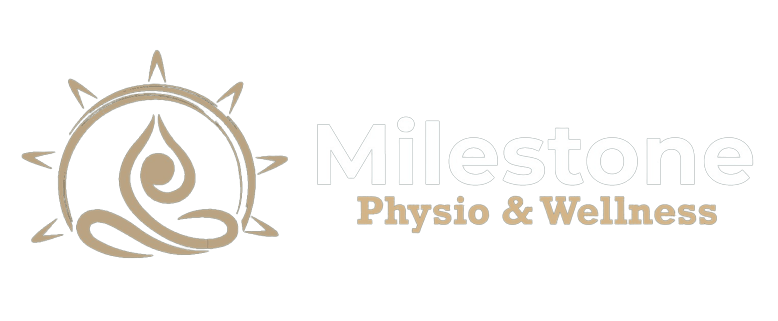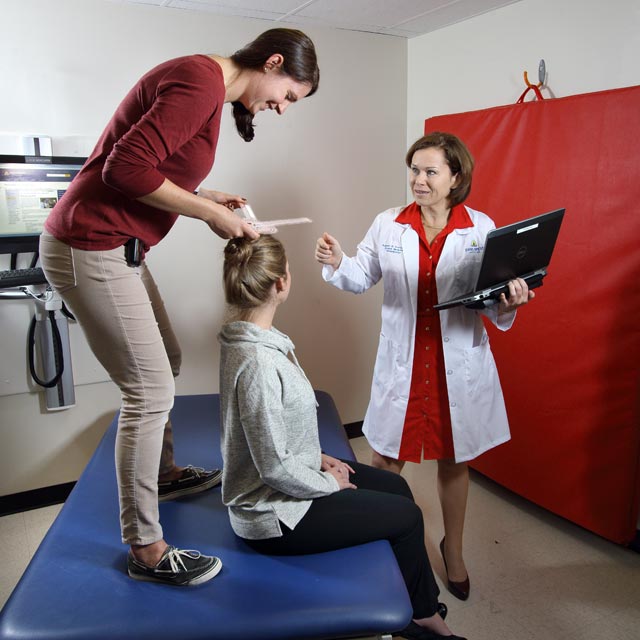CONCUSSION PHYSIOTHERAPY
Concussion Physiotherapy
Globally, concussions have become a top concern for all athletes. As a result, every athletes and sports team look forward to having the best physical therapist that can provide the most effective treatment to address this condition. We at Milestone Physiotherapy specialize in providing concussion assessment, concussion management, and concussion therapy using multi-modal techniques based on modern advances in concussion research.
Milestone physiotherapy is a globally recognized Complete Concussion Management™ (CCMI) clinic in Edmonton. Our physiotherapists are trained to employ the best techniques when handling concussions.
What Exactly is a Concussion?
A concussion can be regarded as a condition that affects the proper function of the body’s neurological system due to a strong, forceful impact on the head or other body parts. When a concussion happens, it causes a biochemical imbalance, lowers blood flow, as well as decreases temporary energy present within the brain cells. Most victims who suffer from a concussion tend to complain of dizziness and imbalance. In addition, they mostly experience pain around the body, especially in the neck and other upper body extremities. Some patients may notice uncontrollable mood swings, changes in their sleeping routine, and difficulty concentrating, remembering, and thinking. Also, in some cases, noise, light, and tasking situations tend to contribute negatively to the patient’s condition.
The certified approach to handling a concussion is “Recognize; Remove; Rest; Rehab”.
Any athlete suspected of having a concussion is advised to stop the game or training in order to be properly diagnosed and placed on a full rest period for a couple of days to recover before returning fully fit back to the game. In a situation where a concussion happens while doing non-sport activities, we strongly recommend that the individual stop all activities they may be doing and focus on resting. At Milestone Physiotherapy, we advise victims of concussion to seek therapist attention within 24 to 48 hours in order to get examined. Kindly know that concussions can occur in children and adolescents while doing recreational or other activities.
How Do I Know Red Flags of Concussion Symptoms
A red flag often signifies high alert or severe risk or danger. In concussion, red flags are used to ensure that there is no possible threat, such as injuries, internal bleeding, or brain swelling, present in the body. When a red flag is detected in the body, getting immediate medical attention from the closest healthcare provider should be the foremost priority.
According to the Centre for Disease Control, here is an outline of all possible red flags that may occur following a concussion.
Red flags signs and symptoms for Adults
- Slurred speech
- Weakness
- Dangerous blood clot
- Headache
- Decreased coordination
- Frequent vomiting or nausea
Other possible signs that signify that a victim requires immediate medical attention following a suspected concussion includes;
- Lose consciousness
- Unusual behaviour
- Looking restless or agitated
- Difficulty remembering people and places
- Look dull and drowsy
- Cannot be woken up
- Suffers from seizures or convulsions
- Irregular size of the eye pupil
- Looking disorganized
Red flag signs and symptoms for kids
Whenever a bump, jolt, or blow happens to the head or any part of a kid’s body, it is recommended that you take them directly to the emergency department for further treatment. Other signs include:
- Continuous crying, even after consoling
- Exhibit any of the above signs related to an adult
- Refuses to eat
If you or your child do not experience any of the above signs and symptoms following a suspected concussion, it is advisable to relax at home for at least a day or two. Research studies have proven that within 1 to 3 days following a concussion, a patient may experience a decrease in recovery speed due to mental and physical activities. Therefore, it is highly suggested that a suspected concussion patient avoid any activity that will aggravate their symptoms.
At Milestone physiotherapy, our certified CCMI specialist will assess your condition using different tests to identify the root cause of your condition, as well as know how you feel. In addition, they will check your memory, balance, coordination, and eye positioning.
It is important to note that a patient who suffers from a concussion may experience a significant energy deficit due to brain injury. And when such happens, the brain, in its low energy state, becomes highly vulnerable to trauma and risk of another concussion. A second concussion can be very devastating and often lead to complex issues such as severe brain injuries, which can cause permanent defects in the brain. Therefore, we urge patients to always seek advice and treatment from a professional CCMI practitioner. Contact Milestone Physiotherapy Clinic to meet with one today!
How Long will it Take to Achieve Complete Recovery From a Concussion?
Most individuals tend to feel better within days of rest following a concussion. However, it is important to know that when the symptoms are gone, that doesn’t mean the brain is back in its proper state. The best method to know if you have attained full recovery following this condition is simply by meeting with a certified CCMI specialist. They will perform varieties of tests on various aspects to know the current state of the brain.
When you meet with Milestone CCMI practitioners, they will use a multi-modal method to assess your post-injury and other possible symptoms. In addition, other areas such as concentration, proprioception, reaction time, balance, memory, strength, and other possible areas of concern will be assessed. For patients, who engage in high-risk activities and sports, will undergo an additional computer-based neurocognitive test.
Most people recover from concussions within 2 weeks after commencing adequate treatment. While younger athletes tend to take much longer to recover. Due to different concussion that occurs, a person’s recovery time may either be quick or may take much time. If a patient’s recovery takes longer, an additional evaluation will be conducted, and their treatment plan will be modified to address identified signs and symptoms.
WHAT’S THE LATEST IN CONCUSSION MANAGEMENT?
Previously, it was often suggested that victims who suffer from a concussion should observe at least a minimum of 24 hours of rest or till all symptoms have been eradicated. However, it has been discovered that this recommendation often poses more threat and discomfort to patients with this condition due to symptom changes.
According to current international consensus, excessive rest may contribute negatively and prolong the symptoms. Therefore, it is advised that after a day or two days of rest, a patient should engage in activities such as cognitive tasks and light exercise that will contribute positively rather than worsen their symptoms. Researchers discovered that a prolonged rest of 5-7 days might have a negative effect on a concussion patient’s health.
get in touch
GET THE HELP YOU NEED TO RECOVER FROM A CONCUSSION
Whether you have been diagnosed with a concussion or you are skeptical if you or your child may have this condition, Contact Milestone physiotherapy in Edmonton to seek adequate evaluation and treatment from a certified CCMI practitioner. They will educate, examine, and prepare an individualized recovery plan to restore your condition to normal.
CONTACT INFORMATION:
Call Us
(587) 875-0640
Email Us
info@milestonephysicaltherapy.ca
Address
6007 Mill Woods Rd S Edmonton, AB T6L 5X9
Working Hours:
Monday – Friday :
Saturday :
Sunday :
- 08.00 A.M – 08.00 P.M
- 08.00 A.M – 08.00 P.M
- 08.00 A.M – 08.00 P.M
Start your physiotherapy journey. Get a free consultation.
Our Service Locations
Physiotherapy services close to home…
- North Edmonton
- South Edmonton
- West Edmonton
- East Edmonton
We provide physiotherapy services throughout Edmonton, including popular areas like South Edmonton, Edmonton West, Windermere, Edmonton Downtown, North Edmonton, Millwoods, Terwillegar, Sherwood Park and even Beaumont.
Frequently Asked Questions
Is physiotherapy good for concussion?
Physiotherapy can be beneficial for concussions, particularly in the later stages of recovery when symptoms persist. It focuses on gradually reintroducing physical activity, improving balance, coordination, and reducing symptoms such as headaches and dizziness.
What kind of physical therapy do you need for a concussion?
The type of physical therapy needed for a concussion depends on the individual’s symptoms and their severity. It may include vestibular rehabilitation, balance training, eye exercises, neck strengthening exercises, and gradually increasing aerobic activity under the guidance of a healthcare professional.
What is the 24 hour protocol for head injury?
The 24-hour protocol for head injury involves closely monitoring the individual for any signs of deterioration, such as worsening headaches, confusion, vomiting, or loss of consciousness. It’s crucial to seek immediate medical attention if any concerning symptoms arise.
What are the 4 P's of a concussion?
The 4 P’s of a concussion are:
- Presence: Recognizing if there’s been a head injury.
- Protection: Ensuring the person is kept safe from further injury.
- Professional evaluation: Seeking medical assessment from a healthcare professional.
- Personal management: Managing symptoms and following recommended recovery protocols.
What are 3 things someone with a concussion should do to recover?
Three things someone with a concussion should do to recover include:
- Rest: Both physical and cognitive rest are essential in the acute stages of recovery.
- Follow medical advice: Adhering to recommendations from healthcare professionals regarding activity levels, medications, and therapy.
- Gradual return to activity: Slowly reintroducing physical and cognitive activities as symptoms improve under medical guidance.
What helps concussions heal faster?
Rest, avoiding activities that exacerbate symptoms, following medical advice, managing stress levels, and gradually returning to activities as symptoms improve can aid in faster concussion recovery.
Does coffee affect a concussion?
Caffeine consumption, like that found in coffee, can potentially exacerbate symptoms of a concussion such as headaches and disrupt sleep patterns. It’s generally advisable to limit caffeine intake during concussion recovery.
Is heat or ice better for a concussion?
Ice is typically recommended for acute symptoms of concussion, particularly to alleviate headaches and reduce swelling. Heat may be more appropriate for muscle tension or discomfort in the neck area, but it’s essential to consult with a healthcare professional for personalized advice.
How can I strengthen my brain after a concussion?
Engaging in activities that promote brain health, such as cognitive exercises, proper nutrition, regular exercise, stress management techniques, and adequate sleep, can help support brain recovery after a concussion.
What do eyes look like after concussion?
After a concussion, some individuals may experience changes in eye movements or visual disturbances such as blurred vision, sensitivity to light, or difficulty focusing. However, the specific appearance of the eyes would not typically change visibly as a direct result of a concussion.
What is your cancellation policy?
We get it – life can be unpredictable. If you need to cancel, please give us a heads-up 24 hours before your appointment, so we can help someone else in your slot.

